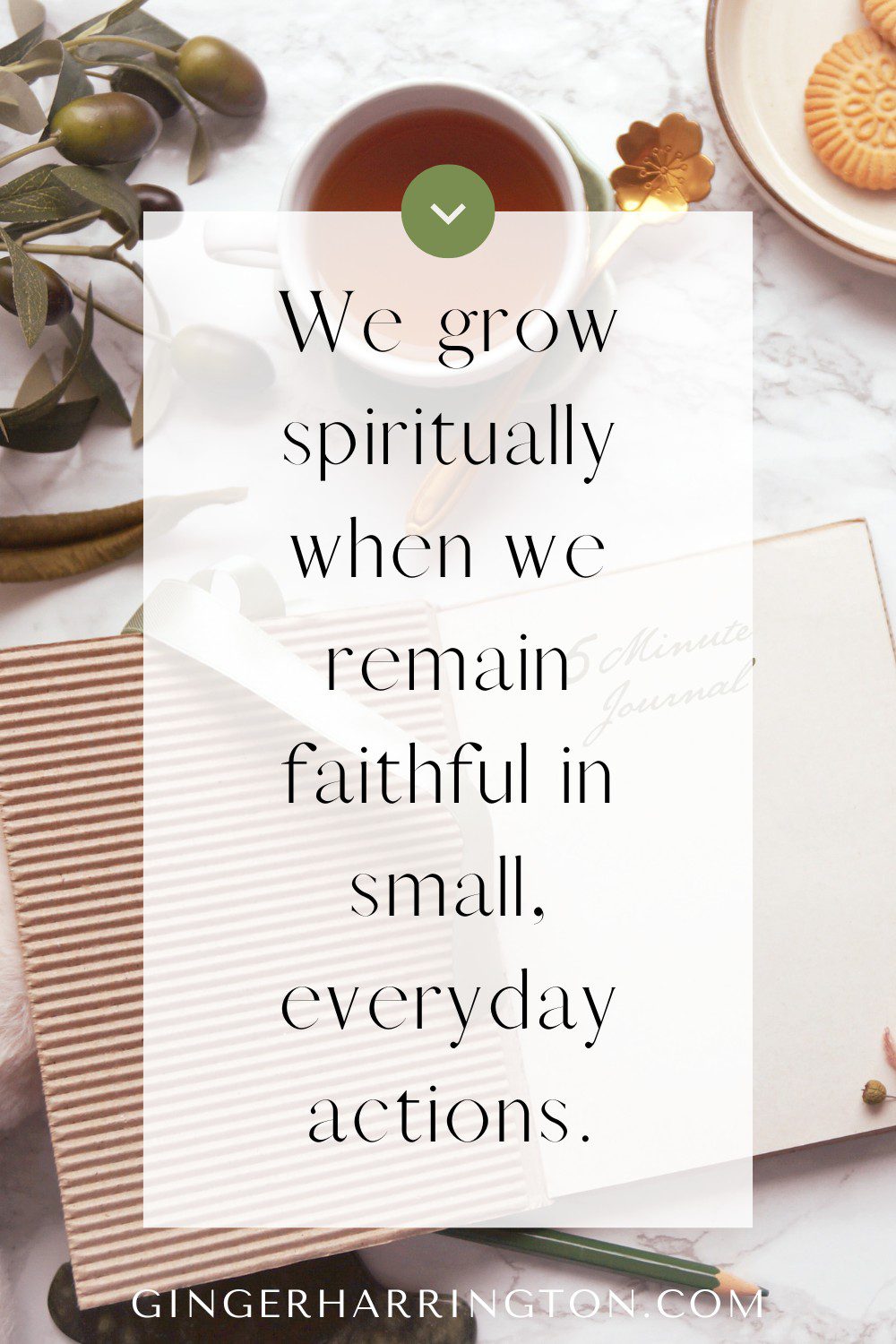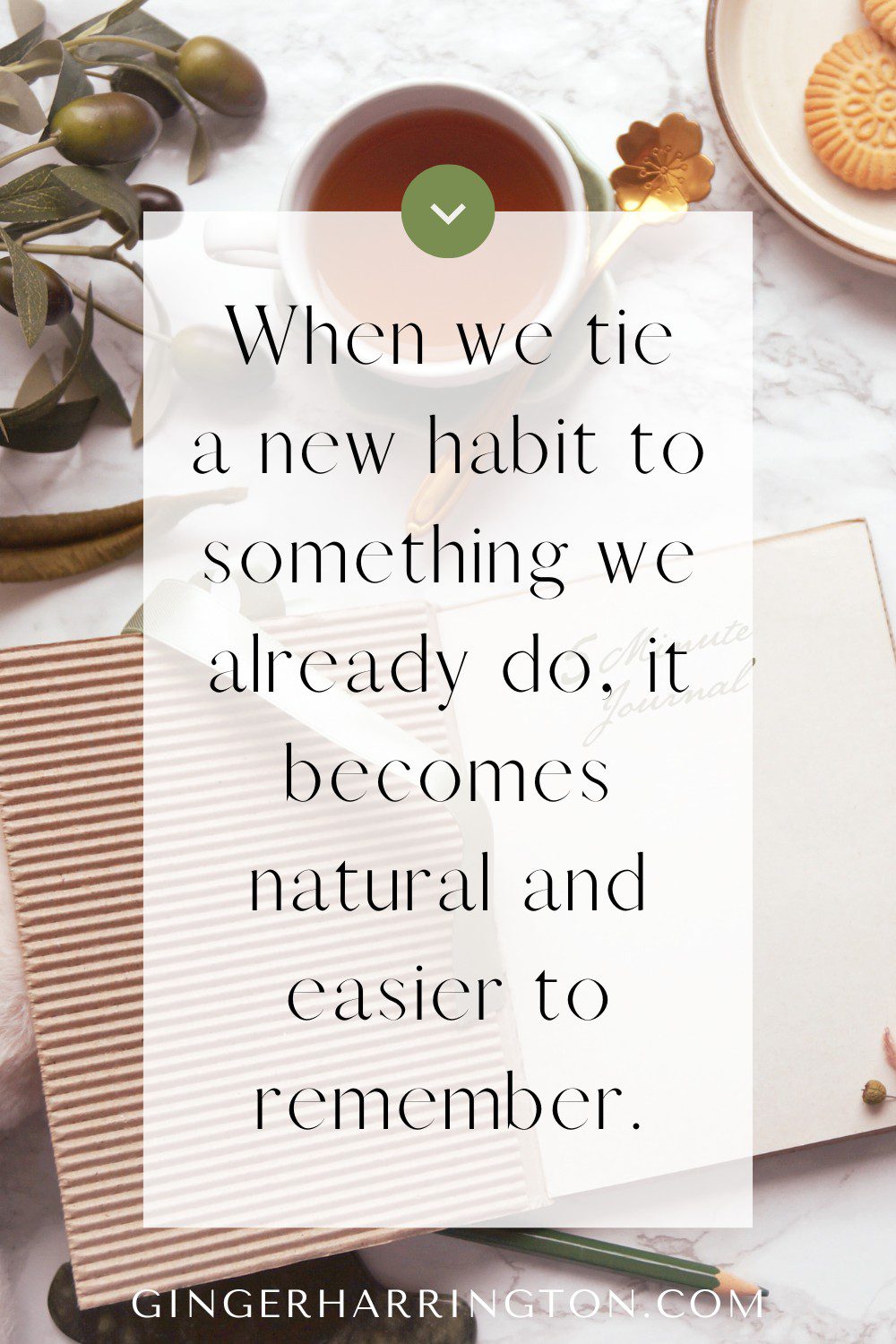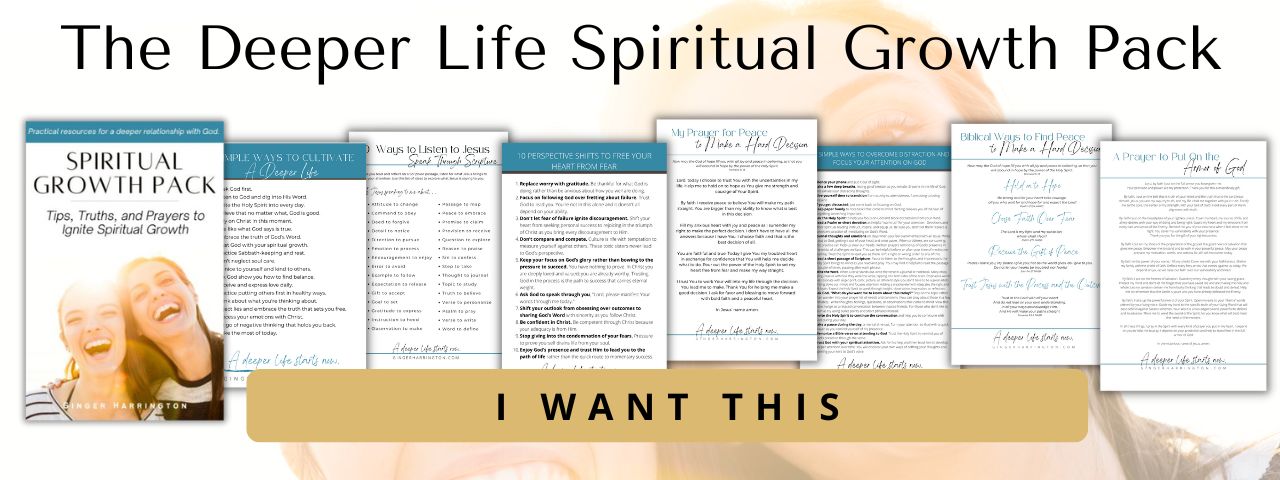Learn the power of tiny habits for spiritual growth. Discover practical ways live out the “faithful in the little things” Bible verse, guided by biblical truths and simple ways to build spiritual habits. Habit stacking can transform your daily routines into opportunities for deeper faith.
What If Spiritual Growth Was Simpler Than You Thought?
Do you feel like life’s busy routines get in the way of building your faith? You want to pray more, but you’re not sure how to add something else to your day.
What if the very habits you already do every day—like brushing your teeth or drinking coffee—could become moments to grow closer to God?
Habit stacking offers a simple, practical way to integrate faith-building practices into your daily life without adding overwhelm. By pairing new spiritual habits with existing routines, you can cultivate hope and deepen your relationship with God.

If you’re not a fan of the word ‘habit,’ don’t worry—it doesn’t really matter what you call it. Whether you think of it as a routine, a practice, or a spiritual rhythm, the key is finding practical ways to be faithful and grow closer to God in your everyday life.
Keep reading to discover how to start habit stacking, reflect on biblical truths about faithfulness in small things, and take small steps to build hope and trust in God. Watch or listen to the podcast for the full content.
Faithful in the Little Things Bible Verse
The words of Jesus in this Scripture verse shows us the importance of training ourselves to be faithful even in the small things.
Matthew 25:21 – “Well done, good and faithful servant. You have been faithful over little; I will set you over much. Enter into the joy of your master.”
I really want to hear Jesus say this, don’t you?
What does it mean to be faithful in the little things?
Faithfulness doesn’t just happen-it is built one day at a time. The word “faithful” in this verse comes from the Greek word pistos, which means trustworthy and reliable.
To be faithful in the little things is to demonstrate consistency, dependability, and honesty in our daily actions—no matter how small or unseen they may seem. It’s about stewarding the time, opportunities and resources God has entrusted to us.
- God values consistency. Just as the servant in the parable was faithful with what God gave him to do, we are called to honor God through steady, reliable actions in our everyday lives.
- Faithfulness leads to joy. When we honor God through small acts of obedience, we enter into the joy and blessing that comes from living in alignment with His will.
- It’s about stewardship. Being faithful means treating every gift, responsibility, and moment as a divine opportunity to glorify God and bless others.
Faithfulness in the little things reflects our trust in God and prepares us for greater responsibilities, blessings and opportunities. It reminds us that spiritual growth is not about monumental achievements but about consistent, steady progress.
Whether it’s committing to a daily prayer, reading scripture, or serving others with humility, God sees and values each step of obedience.

What Is Habit Stacking?
Habit stacking is a concept popularized by BJ Fogg in his book Tiny Habits: The Small Changes That Change Everything. It involves attaching a new, desired action to something you already do consistently, making it easier to remember and integrate into your routine. (Affiliate link)
Fogg’s research highlights how small, simple actions are often the most effective way to create lasting change. They build on existing momentum rather than requiring a complete overhaul of your life. By linking a new habit to something already ingrained, you increase the likelihood of sticking with it over time.
Why Habit Stacking Works:
Fogg explains that habits succeed when they’re anchored to something familiar. This process leverages your brain’s natural tendency to connect related activities, making the new habit feel almost automatic. Each time you practice a habit, the pathway in your brain becomes more efficient, much like a trail becoming clearer with frequent use.
Here’s why habit stacking is particularly effective for Christians who want to cultivate spiritual growth:
- It builds on routines. Adding faith-based habits to your current routines ensures they feel natural and seamless.
- It simplifies growth. Small, manageable actions feel achievable, removing the pressure of drastic changes.
- It creates intentionality. Turning ordinary moments into spiritual opportunities brings focus and purpose to your day.
Larissa put it beautifully in our podcast episode: “Stack your habits, grow your faith.” By tying a new habit to something you already do, you create a reliable rhythm that makes spiritual practices part of your daily life.
From Autopilot to Intentionality:
Harnessing the Power of Small Habits
Have you ever driven somewhere on autopilot, only to realize you weren’t even thinking about where you were going? Habits can be like that—working in the background, shaping our actions without us even realizing it.
My husband jokingly calls me his “auto-pilot woman” because I sometimes operate so automatically I don’t even notice it.
The truth is, being faithful in the little things doesn’t happen by accident.
It takes intentionality. If habits are going to form anyway, why not make them purposeful? Imagine how much spiritual growth could happen if we transformed these autopilot moments into opportunities to connect with God. This is the power of tiny, intentional habits.
.
How to Build Spiritual Habits with Habit Stacking
Habit stacking doesn’t have to be complicated. Think of habit stacking like building a train. Each new habit you attach to an existing routine is like adding another car to the engine. Once the train gets moving, the momentum builds naturally.
5 Steps to Build a Habit Stacking Routine
Here’s a step-by-step guide to get started building faithful habits and routines:
- Identify a daily routine. Look for activities you already do consistently, like brushing your teeth, commuting, or making dinner.
- Choose one spiritual habit. Pick a small action you want to integrate, such as praying, meditating on a verse, or practicing gratitude.
- Pair them together. Attach the new habit to the existing routine (e.g., pray while brushing your teeth).
- Start small. Begin with 1-2 minutes to make it manageable and build confidence.
- Celebrate progress. Acknowledge each time you complete the habit, even with a simple “thank you, God.”
- Adjust When Needed: If a habit doesn’t feel natural, tweak it or attach it to a different routine. Experiment until you find a rhythm that feels natural and easy to keep up with.
Examples of Habit Stacking for Christians
Transform your routines into rhythms of hope and faith. Here are practical ways to integrate faith-building habits into your day:
- Pray while brushing your teeth.
- Express gratitude during your morning coffee.
- Meditate on a verse while commuting.
- Recite a short prayer of trust while washing dishes.
- Listen to a spiritual podcast while folding the laundry.
Each of these small actions reflects the principle that “faithfulness in the small things” leads to spiritual growth. By consistently pairing new habits with your daily routines, you create opportunities for God to work in and through the ordinary moments of your life.
Benefits of Simple Routines for Spiritual Growth
Habit stacking can be a powerful way to be faithful in the little things, even on the busiest days.
Habit stacking anchors your faith in daily life by:
- Turning daily routines into opportunities for spiritual growth.
- Simplifying the process of building new habits.
- Creating a natural rhythm for practicing faith.
- Reducing overwhelm by focusing on small, consistent steps.
- Building momentum for greater changes over time.
Habit stacking isn’t just a tool for productivity—it’s a way to anchor your faith in the everyday moments of life. By turning small, consistent actions into spiritual practices, you invite God into your daily routines and create space for growth and transformation.

Overcoming Challenges: Adjusting as Needed
Sometimes habits don’t stick, and that’s okay. Here are ways to adjust:
- Start smaller: Feeling overwhelmed? Scale back the habit to its simplest form to make it more manageable.
- Experiment with a new cue: Test out different anchors or triggers to remind you of the habit, like a specific action, time, or place.
- Choose a different time of day: If the habit feels forced or inconvenient, move it to a time when it naturally fits better.
- Commit to a short trial period: Start with a one-week commitment to see how the habit works for you before making adjustments.
- Prioritize consistency over perfection: The goal isn’t to be perfect—it’s to stay consistent. Every small effort adds up over time.
Consistency matters more than perfection. Every small effort is a meaningful step in the right direction.
Podcast Quotes to Inspire Your Faith Journey
Sometimes a single phrase can spark encouragement and remind us of God’s faithfulness. Here’s a selection of quotables from the engaging conversation on the podcast:
- “God values faithfulness in the little things—these small moments matter.”
- “Adjusting your habits isn’t failure—it’s part of finding what works for you.”
- “Our brains love shortcuts. Tiny habits make new patterns effortless over time.”
- “Tiny habits pave the way for transformation—small steps create big change over time.”
- “Consistency in one area builds the muscle to be consistent in other areas.”
Which of these resonates most with you today?
Action Steps to Take Today
Ready to get started with a tiny habit? By starting small and staying consistent, you can create habits that cultivate faithfulness in your life. Here are some practical action steps to help you get started on adding tiny habits to your day.
- Identify one routine you already follow daily (e.g., coffee, teeth brushing).
- Choose a spiritual habit to pair with it (e.g., prayer, scripture reflection).
- Track your progress in a journal or app.
.
Each step, no matter how small, is a meaningful act of trust and worship. Remember, spiritual growth is a journey, not a race. Choose one action today, commit to it, and watch how God uses your faithfulness in the little things to transform your life in big ways.
A Word of Caution About Habits
While habits are valuable, they’re the pathway, not the goal. Oswald Chambers offers this wise reminder: “Your god may be your little Christian habit—the habit of prayer or Bible reading at certain times of your day. Watch how your Father will upset your schedule if you begin to worship your habit instead of what the habit symbolizes.’
So as you cultivate habits of faithfulness, remember to hold them with open hands. Be intentional, but flexible. Ask God to guide and bless your efforts as you cultivate faithfulness in the little, but oh-so-important things that honor Him.
Start Small, Stay Faithful
Habit stacking is more than just a productivity tool—it’s a way to deepen your relationship with God and infuse your daily life with hope. As Matthew 25:21 reminds us, God values faithfulness in the little things. By starting small and staying consistent, you can create spiritual habits that transform your life.
Ready to build habits of faith and hope? Listen to or watch the full episode of the Habits of Hope Podcast for more practical tips and inspiring insights. Don’t forget to subscribe and share this post with someone who needs encouragement today!
*This post contains affiliate links at no cost to you.
Related Podcasts for Spiritual Growth Habits
- Episode 5:What We’re Doing in Our Quiet Time Right Now.
- Episode 8: Practical Steps to Trust God in the Moment to Increase Hope
- 18.Start the Year with Hope: Simple Steps to a Balanced Life in 2025.
Related Blog Posts for Spiritual Growth Habits
- 15 Simple Ways to Overcome Distraction to Focus Your Attention on God (with printable)
- How to Stay Focused in Prayer
- Do You Have Spiritual ADD?
- 10 Benefits of Reviewing What We Learn from God
- 15 Habits of Rest that Will Improve Your Life
- Strategies and Scriptures to Combat Negative Thinking: With Free E-book



 So glad you're here. I help busy women—gals like you— build healthy habits for living well with biblical wisdom and practical steps to deepen your faith, increase your hope, and thrive in your purpose.
So glad you're here. I help busy women—gals like you— build healthy habits for living well with biblical wisdom and practical steps to deepen your faith, increase your hope, and thrive in your purpose.



